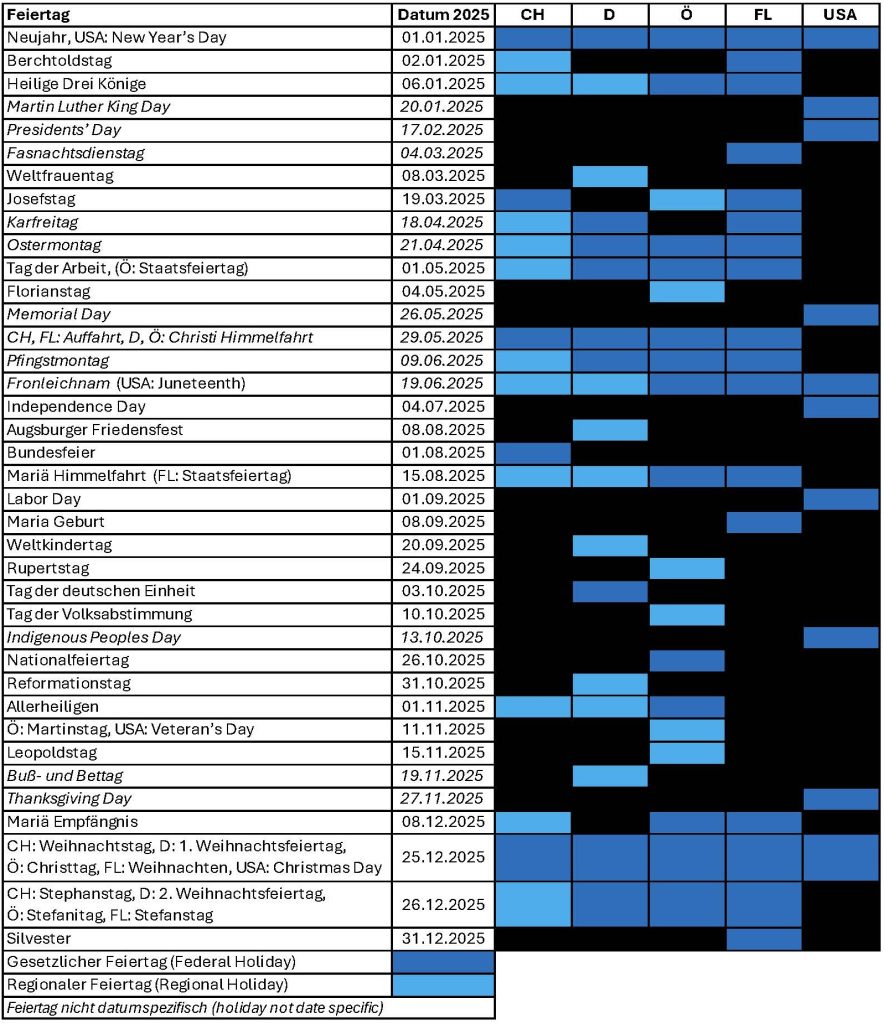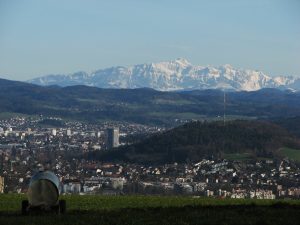5.1 Ferien, Urlaub und Geografie

Lektionsüberblick
1) Schulferien und Feiertage
Many Europeans are often astounded by the very long summer break we typically have in the US, around 10 weeks, compared to their 6 weeks. It may look like American children attend much less school than European children. However, if you look at the whole school calendar, you can see that some US schools have little or no fall break and only one week off in the spring, whereas the schools in German-speaking countries often have a two-week fall break, a two-week spring break, and additional days off. For example, schools in Switzerland, Austria, Liechtenstein, and some German states have Sportferien or a Sportwoche in late winter or early spring, in order for families to go skiing. (The schools in German-speaking countries and US schools tend to have the same 2 weeks off over the Christmas holidays.) You can see these differences and similarities in the following images. (With the exception of Liechtenstein, the images only show a selection of the Kantonen, Bundesländer, or states.)

As you can see, the Swiss school calendar not only depends on the individual Kanton, but also on the kind of school in that Kanton. For example, the Gymasium Laufenthal-Thierstein in region around Basel has slightly different Ferien than all of the other schools.

The German school calendar does not include a Sportwoche, altough some states have Winterferien. Yet other schools have Pfingstferien instead. Pfingsten is a church holiday called Pentecost or Whitsuntide. The Monday after Pfingsten (called Pfingstmontag) is a holiday in Germany, Austria, Liechtenstein, and parts of Switzerland. Some states take a longer school break over this holiday.

The Austrian school calendar calls their late winter/early spring break Semesterferien. Ostern is Easter. Like with Pfingsten, the Monday after Easter is called Ostermontag and is a holiday in Germany, Austria, Liechtenstein, and parts of Switzerland.

Liechtenstein’s school calendar is very straight-forward. After all, the total population is smaller than 40K.

This school calendar is for Albany County in Wyoming, where UW is located. Because the university is the largest employer in town, the school calendar, in particular the spring break, usually follows the university calendar.

Wie kann man über die Unterschiede sprechen?
Die amerikanischen Sommerferien sind länger als die schweizer Sommerferien.
Die amerikanischen Herbstferien sind kürzer als die schweizer Herbstferien.
Die Ferien in Burgenland sind so lang wie die Ferien in Kärnten.
Kinder auf Schulen im deutschsprachigen Europa haben mehr schulfreie Feiertage als Kinder auf amerikanischen Schulen.
Kinder auf amerikanischen Schulen haben weniger schulfreie Feiertage als Kinder auf Schulen im deutschsprachigen Europa.
Kinder auf Schulen im deutschsprachigen Europa haben keine Thanksgivingferien, weil Thanksgiving ein amerikanischer Feiertag ist.
Österreich hat die meisten Feiertage.
Let’s practice!
Deutsch IRL – Sommerferien
- Sommerferien (Madsen): Lied
- Sommerferien (Nielsen) : Lied
- Sommerferien (Rhythmical): Lied mit Klatschspiel
- Warum pauken französische Schüler in den Ferien? (4m): Short video about French children studying during summer break.
- Was haben sie in den Sommerferien gemacht? (3m): Short video for German learners
- Sommerferien in Deutschland: Short story with reading comprehension questions
- Ferien: Short story with reading comprehension questions
- Sommerferien (7m): Podcast for German learners
Jetzt bist du dran!
Du hast zwei Aufgaben:
1) Wie lange waren die Sommerferien an deiner High-School? Waren sie länger oder kürzer als in Laramie? als in Zürich? Answer the questions in your written journal using the modeled language above.
Then record your answer in your audio journal.
2) Pick one of the Feiertage celebrated in Switzerland and look up information about it. Write down 2-3 interesting facts about this holiday in your written journal. Challenge yourself and write the facts down in (your) German!
Winterthur im Blickpunkt

Winterthur ist heute die sechstgrößte Stadt der Schweiz. Im Jahr 1467 erlebte die Stadt jedoch einen finanziellen Tiefpunkt und wurde bis 1798 von der Großstadt Zürich übernommen. Seit 1798 ist Winterthur wieder selbstständig und gehört zum Kanton Zürich, also wie eine eigene Stadt innerhalb desselben Kantons.
Winterthur is currently the sixth-largest city in Switzerland. However, in 1467, the city experienced a financial low and was absorbed by the city of Zurich until 1798. Since 1798, Winterthur has been independent again and is part of the canton of Zurich, thus being considered a separate city within the same canton.
2) Urlaubsarten
When school is out, it may be time to travel! When you are traveling with your family, that is called the Familienurlaub, the family vacation. Wie waren deine Familienurlaube? What were your family vacations like? The following presentation shows you some typical kinds of vacations. Are any of them familiar to you?
Deutsch IRL
- Familienurlaub an der Ostsee: Deutschland oder Polen? (13m): A video report of a family comparing a vacation at the Baltic Sea from the German and Polish sides.
- Der Familienurlaub (Schlimmer geht’s immer mit Milo Murphy, 10m): A Disney show dubbed in German, this episode about a family vacation.
- Mit dem Wohnwagen nach Südfrankreich (45m): Short documentary about a Turkish-Germany family who takes up camping.
- Der Familienurlaub (5m): short audio story about a family vacation.
- Urlaub: Die Deutschen machen gerne Urlaub (5m): A short video with comprehension exercises. Nina und David wollen herausfinden, welche Urlaubsziele bei den Deutschen besonders beliebt sind, und machen selbst auch für ein paar Tage Urlaub. Dafür müssen sie gar nicht weit weg fahren.
- Der Skiurlaub: Short text with reading comprehension questions.
Jetzt bist du dran!
Bist du in den Ferien mit deiner Familie in den Urlaub gefahren? Wie alt warst du? Was für einen Familienurlaub war er? Answer the questions in your written journal using the modeled language above. For this entry, keep it simple. In future lessons, you can expand on this vacation and provide more detail.
When you are doing, check your spelling and structures. Then record your answer in your audio journal.
3) Wohin geht die Reise?
Die Geografie
| Die Ärzte’s popular 1988 song Westerland is a hommage to a part of the island Sylt in der Nordsee.
You can watch the music video and read along with the lyrics.
Vokabelhilfe:
der Wannsee – ein See in Berlin
die Sehnsucht – the yearning den Verstand verlieren – to lose one’s mind die Nordsee – the North Sea das Ufer – the shore retten – to save untergehen – to sink down/ to drown unter sich sein – to be among others |
Die Länder und Bundesstaaten
Deutsch IRL
- Bitte wenden, Lied, ok.danke.tschüss feels that an entire generation is dependent on apps and smartphones and can no longer find their way around on their own. What is virtual and what is real? The two worlds seem to be merging. The link leads you to the song and some activities.
- Auf dem Weg, Lied, Mark Forster, a song about going somewhere. How many direction words can you understand? Click on “Show more” to see the lyrics.
Jetzt bist du dran!
Wohin bist du gefahren? Think about the last time you left Laramie. Where did you go? In your written journal, answer the question using the language modeled above and include any geographic features you may have passed by or driven through.
When you are done, record your answer in your audio journal.
Jetzt kombinieren
In our first lesson on travel, you learned how to talk about 1) days off from school, 2) different kinds of vacations, and 3) location, location, location. Now let’s combine everything!
Write about a Familienurlaub including information about how old you were, which Ferien you were on, what kind of vacation it was, where you went and which geographical features did you drive by or drive to.
At this point, you do not need to add more detail. It is more important to stay with the modeled language and write what you know.
Media Attributions
- Schulferien sources: Die Schweiz, Deutschland, Österreich,Liechtenstein, USA
- Nationalfeiertage sources: Die Schweiz, Deutschland, Österreich,Liechtenstein, USA
- Urlaubsarten presentation and activity adapted from Grenzenlos Deutsch, licensed under CC BY-NC-SA 4.0 International license.
- Geography matching adapted from zum.de, licensed under CC BY-SA 4.0 International License.
- In/nach preposition sentences adapted from zum.de, licensed under CC BY-SA 4.0 International License.
- Zu preposition sentences adapted from zum.de, licensed under CC BY-SA 4.0 International License.
Media Attributions
- 2030-2040 ch banner reduced size
- Screenshot
- Screenshot
- Screenshot
- Screenshot
- Schulferien 2025 USA
- 5.1 Feiertage vergleich 2025
- Photo of Winterhur by David Lienhard, Flickr, CC BY 2.0

